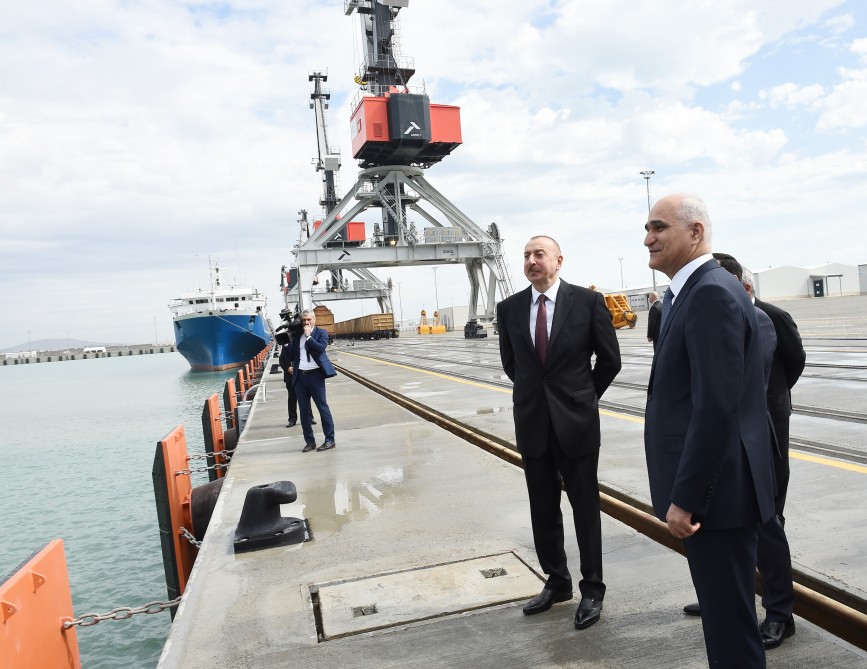A senior Iranian trade official has said that Tehran and Baku have agreed to further expand their cooperation regarding ports located in either Caspian country, during an international conference held in Baku from May 8-11.
Iran’s Deputy CEO of Ports and Maritime Organization (PMO) for Maritime Affairs Hadi Haghshenas, who attended the International Association of Ports and Harbors (IAPH) World Ports Conference 2018, said that talks are underway to increase trade and transportation between Iranian ports and the Baku International Sea Trade Port in Azerbaijan.
“Strategies to increase the volume of trade between the ports, finding the best transportation routes and changing experiences were among issues discussed at the conference,” Iran’s Mehr news agency reported. Iran has invested $3.1 billion to Azerbaijan so far, and over 700 Iranian companies have been registered in the fields of industry, construction, services, communication, trade, transport and agriculture.
During the meeting, officials also stressed the need to better facilitate the transiting of goods via the North-South corridor, the report added.
The International North-South Transport Corridor, one of the key areas of the Azerbaijani-Iranian cooperation, is being intensively carried out. The corridor will connect India, Iran, Azerbaijan, Russia, Central Asia and Europe via 7,200 km (4,474 mi) of railway tracks. The new corridor is expected to increase the 600,000 tons per year of commodities currently being traded between Iran and Azerbaijan to five million at the corridor’s inception, and later to 10 million tons per year.
Azerbaijan launched a pilot run of the Astara-Astara line in December, which is part of the International North-South Transport Corridor. The railroad runs a distance of 8.3 km (5.2 mi) up from its southern border with Iran, into which it extends 1.4 km (0.87 mi) to Iran’s port city of Astara.
On Monday, addressing the opening ceremony of the Baku International Sea Trade Port Complex in Alat, Azerbaijani President Ilham Aliyev said, "We have allocated additional funds to complete the North-South Transport Corridor, and I am sure this railway will be put into operation in the next few years. Thus, Azerbaijan, which has no access to open seas in Eurasia, will become a transport and logistics hub. We already see this, we are already fulfilling this function," according to the state-run Azertag news agency.
"A lot of works have been done so far. We have the largest fleet, more than 260 vessels in the Caspian Sea. I was informed that additional 18 vessels were bought during past years. A shipbuilding plant was built in Baku with my initiative. We can build all types of ship, we build and we eliminated dependence on foreign partners," President Aliyev said.
The Baku International Sea Trade Port at Alat is replacing the old port at Baku. The volume of cargo transportation through the port, excluding the oil terminal, increased by 31 percent in 2017 as compared to 2016. The volume of freight traffic totaled 4.4 million tons in 2017.
After the completion of the first phase in the first half of 2018, the Baku Port will be able to receive up to 15 million tons of cargo per year, and handle up to 100,000 twenty-foot equivalent units (TEU) annually. At the second stage, the port’s cargo handling capacity will reach 25 million tons of cargo and 500,000 TEUs.
The managing director of Iran’s Ports and Maritime Organization Mohammad Rastad said on the sidelines of the conference that Iranian ports located along the Caspian Sea have the nominal capacity of around 30 million tons, but they are working at about one-fifth of their capacity that is no more than 6 million tons, according to Islamic Republic News Agency.
Both Azerbaijan and Iran are interested in expanding relations between their ports in the Caspian Sea, as the expansion of the relations will contribute to an increase in the volume of transit freight, bringing additional revenues. Several Azerbaijani companies work also in the Anzali free economic zone, which is located on the southern coast of the Caspian Sea.







 Armenian sappers commenced on Monday mine-clearance operations in the territories adjacent to the Saint Mary Church in village of Voskepar (Armenia...
Armenian sappers commenced on Monday mine-clearance operations in the territories adjacent to the Saint Mary Church in village of Voskepar (Armenia...
 Russian Foreign Minister Sergei Lavrov has reasserted that Moscow has no intentions to stop the fighting in Ukraine, even if peace talks commence.
Russian Foreign Minister Sergei Lavrov has reasserted that Moscow has no intentions to stop the fighting in Ukraine, even if peace talks commence.
 Iran has refuted reports of alleged damage to Shimon Peres Negev Nuclear Research Centre located southeast of Dimona, Israel, during the recent air...
Iran has refuted reports of alleged damage to Shimon Peres Negev Nuclear Research Centre located southeast of Dimona, Israel, during the recent air...



